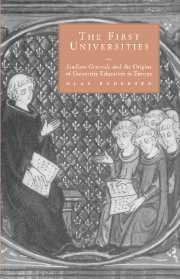Book contents
- Frontmatter
- Contents
- Preface
- Preface to the English edition
- List of abbreviations
- 1 The classical inheritance
- 2 From ancient science to monastic learning
- 3 The Carolingian Renaissance
- 4 The schools of the middle ages
- 5 From school to studium generale
- 6 The battle for the universities
- 7 Structure and form of government
- 8 The material situation
- 9 The road to degrees
- 10 Curricula and intellectual trends
- Index of names
9 - The road to degrees
Published online by Cambridge University Press: 03 November 2009
- Frontmatter
- Contents
- Preface
- Preface to the English edition
- List of abbreviations
- 1 The classical inheritance
- 2 From ancient science to monastic learning
- 3 The Carolingian Renaissance
- 4 The schools of the middle ages
- 5 From school to studium generale
- 6 The battle for the universities
- 7 Structure and form of government
- 8 The material situation
- 9 The road to degrees
- 10 Curricula and intellectual trends
- Index of names
Summary
After discussing the student's material welfare in the last chapter, it is time to look at the more ‘academic’ side of his life, from his qualification for university as a green grammar-school boy, to when six to twelve years later he passed his final examinations. The sources for this part of the history of the universities are rather various, and far less abundant than one could wish. This is because the universities rose up on the foundations of twelfth-century schools which followed an even older tradition of learning, and one that was certainly never committed to paper in the form of syllabuses or examination decrees. By and large where this early period is concerned, therefore, we shall turn to the few autobiographical passages that are found in the writings of Peter Abelard, for example, or of John of Salisbury. Things were no better in the universities just after their foundation. The unwritten tradition reigned in this period too, until conflicts and cases of doubt made well-defined rules necessary, and thereby brought statutes regulating courses of study and examinations into being. In the case of the older universities, this took place about half way through the thirteenth century, where our information comes from documents as important as the oldest statutes of Cambridge and the very detailed regulations that were passed in 1252 and the following years in the faculty of artes in Paris, first by the English nation and then by the university as a whole. But these sources only show how the prescribed course of study proceeded.
- Type
- Chapter
- Information
- The First UniversitiesStudium Generale and the Origins of University Education in Europe, pp. 242 - 270Publisher: Cambridge University PressPrint publication year: 1998



